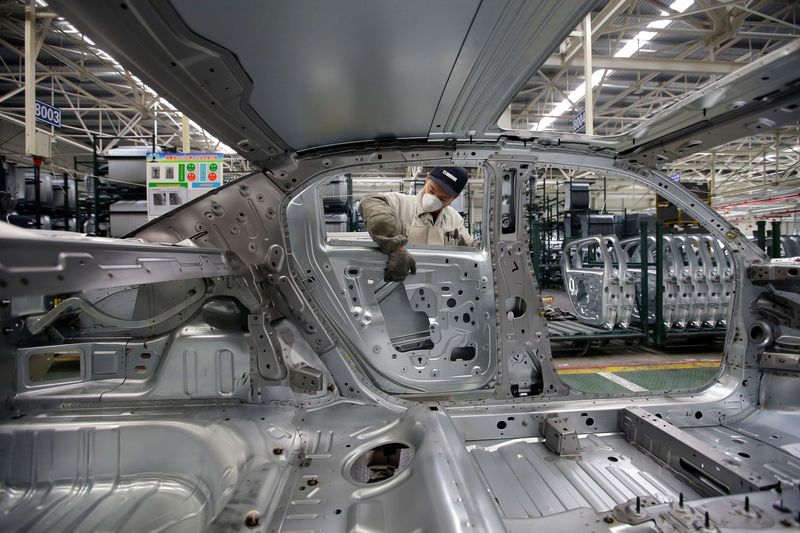By Yilei Sun and Laurence Frost
BEIJING/PARIS (Reuters) - Peugeot maker PSA Group (PA:PEUP) and partner Dongfeng Group (HK:0489) have agreed to cut thousands of jobs in China and drop two of their four shared assembly plants, according to a document seen by Reuters, in a last-ditch bid to curb mounting losses as the world's largest auto market loses steam.
Dongfeng Peugeot Citroen Automobiles (DPCA), the carmakers' joint venture based in Wuhan, central China, will halve its workforce to 4,000 as it closes one plant and sells another under plans agreed last month between PSA boss Carlos Tavares and Dongfeng Chairman Zhu Yanfeng, the document showed.
Both carmakers declined to comment on details of their restructuring plans. "We are working with our partners to improve the overall performance of our business in China in all its dimensions," a PSA spokesman said.
The agreement may avert a threatened withdrawal by PSA, according to two sources at the French carmaker who said their chief executive had signaled that PSA might otherwise exit the 27-year-old partnership with its 12.2% shareholder Dongfeng, or even leave China altogether.
"We're just a whisker away from having to withdraw from China," said one person close to the PSA board. "It really is that serious."
PSA is attempting a reboot in adverse conditions. Once an auto industry cash cow, the Chinese market contracted last year for the first time since the 1990s and is expected to decline another 5% in 2019, squeezed by a worsening U.S.-China trade war.
Many Western carmakers were already struggling before the downturn, as Chinese consumers abandoned their mid-market brands for increasingly assertive domestic rivals https://www.reuters.com/article/us-autoshow-shanghai-saicgeely/chinese-automakers-saic-geely-turn-up-heat-on-global-rivals-idUSKBN17J128 including the global manufacturers' own local partners.
PSA's deep China problems go back even further, spanning four years of plunging sales and 400 million euros ($450 million) written off its DPCA stake, which is now valued at 500 million euros.
Its sales in the country shrunk almost threefold to 251,700 vehicles last year from a 2014 peak of 731,000.
"We're not giving up," a PSA spokesman said. "We are still pursuing our action plan to cut fixed costs."
DPCA will now close its original assembly plant, Wuhan 1, and redevelop the site in a commercial partnership with the local government, according to the plans. The factory's tooling and production will be transferred to the Wuhan 3 facility.
Headcount across DPCA will fall from 8,000 to 5,500 by the end of 2019 and to 4,000 within another three years, as it also sells off its idling Wuhan 2 facility, according to the document - which noted ongoing discussions with unidentified potential buyers.
Underperforming vehicles will be dropped as the Peugeot and Citroen lineups are streamlined around more profitable models, mirroring the European turnaround strategy now powering record margins in PSA's home markets.
HURDLES
The carmakers' dealings have often been fraught, and PSA executives including Tavares have voiced frustration with DPCA's management. The French group's shares briefly spiked on an Aug. 7 report that Dongfeng was preparing to divest its PSA stake, acquired in a 2014 bailout.
Questioned by analysts about China operations, Tavares pledged during PSA's July 24 earnings call to "accelerate variable cost reduction, reduce fixed cost" and boost pricing.
"Our partner is in the same mindset," he said of Dongfeng. "They also want to accelerate."
The restructuring faces hurdles, not least the challenge of finding a Wuhan 2 buyer amid mounting uncertainty - although Chinese government restrictions on greenfield sites may help.

Over the past 18 months, Dongfeng's Chairman Zhu tried repeatedly to persuade Honda (T:7267) or Nissan (T:7201) to take over one of the DPCA plants, Reuters reported on Aug 1.